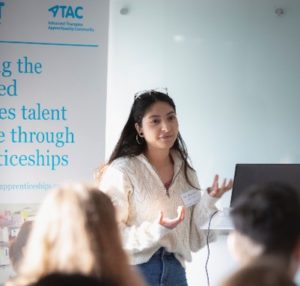 Emilia Reyes Pabon is a Level 3 Operations Technician for advanced therapy medicinal products (ATMPs) at the University of Oxford’s Clinical BioManufacturing Facility (CBF). The CBF is an innovative Good Manufacturing Practice (GMP) facility which produces investigational medicinal products, including for the recent manufacture of a promising vaccine candidate for COVID-19.
Emilia Reyes Pabon is a Level 3 Operations Technician for advanced therapy medicinal products (ATMPs) at the University of Oxford’s Clinical BioManufacturing Facility (CBF). The CBF is an innovative Good Manufacturing Practice (GMP) facility which produces investigational medicinal products, including for the recent manufacture of a promising vaccine candidate for COVID-19.
The opportunity to gain experience and employability which aligned with her career ambitions, and to earn while learning, prompted Emilia to apply for the Operations Technician apprenticeship at the CBF. Emilia was successful and started in February 2019, and the variety of skills and unique experiences Emilia has gained so far provide a platform for a career innovating in the cell and gene therapy industry.
Pioneering work in COVID-19 vaccine development
The CBF has played a pivotal role in the development of ChAdOx1 nCoV-19, the University of Oxford’s investigational vaccine against the coronavirus SARS-CoV-2 which causes the infectious disease COVID-19. The CBF needed to manufacture the vaccine quickly and safely for a UK phase I/II clinical trial initiated in April, a monumental effort which Emilia was proud to be a part of.
“The highlight of my apprenticeship so far is being part of the manufacture of our ChAdOx1 nCoV-19 vaccine. We all as a team have put in lots of hours and dedication to ensure the vaccine was manufactured in a record time while maintaining high quality standards and ensuring patient safety throughout all the processes, and we take pride in that.”
Emilia Reyes Pabon, Apprentice Operations Technician, Clinical BioManufacturing Facility
Recently published results from the phase I/II study show that the vaccine induces a strong immune response, and the University of Oxford and AstraZeneca are now collaborating with partners around the world to study the vaccine in phase III trials.
Learning and contributing as part of a team
As an Apprentice Operations Technician, some of Emilia’s responsibilities include ensuring critical equipment functions correctly such as liquid nitrogen tanks, performing activities in cleanrooms such as autoclaving and environmental monitoring, disposing of hazardous waste, and helping to define standard operating procedures. Emilia has enjoyed and benefitted from learning from colleagues with industry experience, expertise, and from an environment where everyone is willing to help.
One day per week, Emilia studies towards her Level 3 qualification in Applied Sciences as part of the 20% off-the-job training portion of the apprenticeship. Advanced therapies apprenticeships are designed with industry stakeholders and supported by established training providers, providing theoretical knowledge to complement on-the-job learning.
Supported by the Advanced Therapies Apprenticeship Community (ATAC)
As an advanced therapies apprentice, Emilia and her employer have access to a wide variety of support provided by ATAC including:
- Access to learning resources and technical webinars from industry experts
- Cohort days for apprentices from different organisations to meet, share their experiences and collaborate
- Advice for professional development, such as presenting and networking
- Membership of a network of apprentices, employers, and training providers across advanced therapies
Developing skills and employability for the future
ATAC has designed a range of programmes, from entry-level to Master’s-equivalent apprenticeships, to bring in new talent and upskill staff for the rapidly growing UK cell and gene therapy industry. The number of ATAC apprentices more than doubled in one year, now 72 apprentices employed at 27 UK companies, as the initiative continues to provide a platform for developing industry innovators of the future.
Emilia is aiming to finish her Level 3 apprenticeship through CSR Group this year and progress to a higher apprenticeship at the CBF with the University of Kent, with the ambition to becoming a scientist in the future.
“I would definitely recommend becoming an advanced therapies apprentice. It is a great opportunity to learn and obtain a qualification while you are gaining experience working in the industry. I found that while doing my A-levels it was a bit hard to remember certain procedures just by reading them from the textbook, and I realised that work experience made learning for me easier.
I have also gained very important transferable skills that can help on a day to day basis, such as technical skills, critical thinking and problem-solving. You will become more employable because you gain years of experience in the sector you are passionate about.”
Emilia Reyes Pabon, Apprentice Operations Technician, Clinical BioManufacturing Facility
